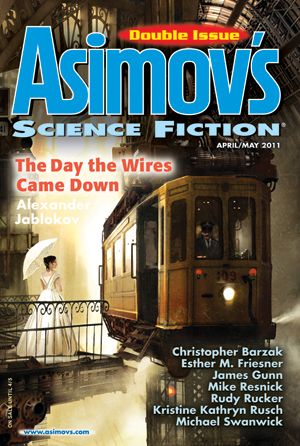Resnick, Mike: Homecoming

The Homecoming (2011)
Written by: Mike Resnick
Genre: Short Story/Science Fiction
Published by: Asimov's
Rating: It's a Gamble
I'm rating this story a wee bit lower than I think is fair, but based on my rating system, I don't consider it a "Good Read," and if I said "Worth Reading, with Reservations" (which is right below "Good Read"), I'd be lying. I don't have reservations about this story. It just didn't click, but that doesn't mean it won't grab someone else and smack them with a sense of wonder. Therefore, it's a gamble.
For my two cents, this piece is rather all over the place. It starts out with a Kafka-esque moment, except instead of the narrator turning into a giant bug, the narrator wakes to find a giant bug before him, and it's his son. Of course, in this story, the son's transformation is well-known and a major point of contention, one I admit was a bit neat for the question it raised: if you had the opportunity to travel outside of this Earth, outside of this solar system, to study life on a completely different planet in a completely different galaxy, but you had to utterly transform your body into something not human, would you do it? Would you leave everything and everyone you've ever known, in order for this one opportunity?
That's what Phillip was trying to impress upon his father, the narrator. All of this happened while taking care of the wife/mother, Julia, who suffers from Alzheimer's. Once we learn that tidbit, the immediate Kafka-esque creepiness wears off and the story starts to veer into something I can't quite put my finger on.
Consider: it's trying to be an emotional sucker-punch of a piece. I mean, the mom has Alzheimer's, doesn't recognize her own son (understandable, he does look like a bug) despite his efforts to explain, and keeps forgetting pieces of information she was told seconds before. It seemed right, though I've never dealt with Alzheimer's personally. I know people who have, and the circular method of conversation felt right, but the story never got to me emotionally. Is it because I don't have that intimate experience, and therefore heartbreak, that comes with taking care of someone with Alzheimer's? Or is it because I'm reading through the POV of an old man taking care of his wife while hating and resenting his son's decisions in life and I can't relate? Jordan, the father, is so tender and caring with his wife, but the anger he feels for his son for leaving them borders on outright hate and ignorance, leaving me to wonder just how much of this story was meant to be a metaphor for homosexuality. Consider:
“You know what would have made me happier? Grandchildren. A son who visited us for Christmas. A son I could leave the house to now that it’s finally paid off. I never asked you to follow in my footsteps, attend my college, go into my business, even live in this town. Would expecting you to want to be a normal human being be so goddamned wrong for a father?”
His son's response (a wee bit farther down on the page:
“Would you have disowned me if I’d been sterile and couldn’t give you any grandchildren?”
“Don’t be silly.”
“What if I’d moved halfway around the world? I might not have seen you more than once a decade if I had. Would you have disowned me as you did eleven years ago?”
“Nobody disowned you,” I pointed out, trying to keep my temper. “You disowned us.”
Personally, I think I'm reaching here, so I'd love some insight by others who've read this. Maybe I feel like I'm reaching because the point, the argument itself, is also reaching? I never feel like I fully understand the father's motivations behind his anger. Of course, human emotion is a complex thing, and we don't always understand the motivations behind our own emotions, let alone the emotions of other people. But there's a difference between understanding emotions and not understanding them but feeling the truth of them all the same. The father comes off as untrue somehow, and again, perhaps it's because I'm not an old man that keeps me from connecting to the narrative.
It's not all bad, of course. There are moments that are sharp, like this:
“Tired old houses are like tired old men,” I said. “They don’t function on all cylinders.”
Which got a laugh out of me for the truth of the sentiment and the clever way it's described. And later on, when Phillip is telling a story to his mother (his own story, but disguised as a fairy tale) and describing all the wonders he's seen, I think the reader is supposed to be as awed as she. I think the reader is supposed to recognize these stories as the bridge they're meant to be, reuniting father and son. Yet, I never really connected. Admittedly, there are some nice moments (I love how Phillip chimes), but as a whole, I'm hard to win over in the wonder department, and by time I was done with the story, I felt like it was trying way too damn hard to make me cry, and as a result, it felt false.
Mind you, it's not a bad story. It didn't click for me, but it's possible it'll click for other readers. After all, it did get nominated for a Hugo, so certainly some people had to love it. It's a story that's sure to generate some interesting discussion, so feel free to click the link above to check it out!